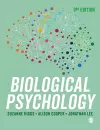
Biological Psychology
3 authors - Hardback
£132.30 was £147.00
Professor Suzanne Higgs has a degree in Psychology, Philosophy and Physiology from the University of Oxford, UK. During her degree she became fascinated by the effects of drugs on the brain and behaviour, which motivated her to pursue a PhD in Psychopharmacology at the University of Durham. After her PhD, she worked as a Postdoctoral researcher at the University of Oxford before moving to the University of Birmingham, UK to take up a faculty position in the School of Psychology. She has taught at all levels on the BSc in Psychology programme at Birmingham and has over 20 years of lecturing experience. She specialises in teaching psychopharmacology and the biological bases of motivated behaviours, in particular, the psychobiology of appetite, which is the topic of her research. Dr Alison Cooper’s interest in Neuroscience began during her Natural Sciences degree when she accidentally found herself studying the properties of neurones that form the circuit that control grasshopper movement. She pursued an interest in understanding how activity of neuronal cells could underpin behaviour for her PhD by researching the properties and functions of the parts of the brain that contribute to human motor behaviour. During this time, she became interested in neuropharmacology, and the link between synaptic neurotransmission and human function/ dysfunction has remained the focus of her thoughts. Following various Postdoctoral positions, she took an ever-greater role in Neuroscience education of undergraduates on various professional and non-professional undergraduate programmes. In recent years she has used her experience to extend her interest in education to the general public who want to understand their own or others’ brains through public engagement in person and, globally, through online courses. Professor Jonathan Lee has a degree in Natural Sciences, specialising in Neuroscience, from the University of Cambridge. He has always been interested in the value of studying biological mechanisms in order to understand behaviour. This interest has been particularly focused on unconscious memories and their impact upon behaviour. In his PhD and Postdoctoral research, also at the University of Cambridge, he studied the contribution of gene expression and pharmacological mechanisms in the processes underlying long-term fear and addictive drug memories. He has continued these research interests since moving to the University of Birmingham, using his research experience to teach an introduction to Biological Psychology in the BSc Psychology programme.